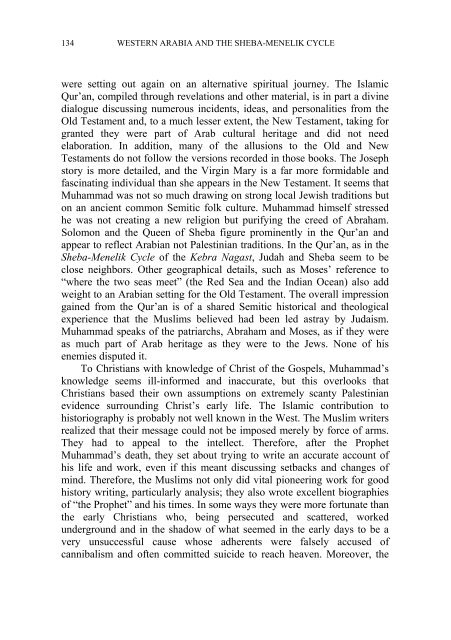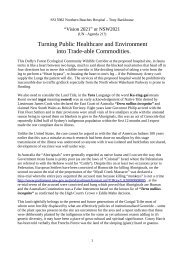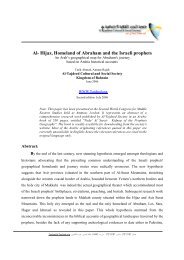Sheba
Sheba
Sheba
You also want an ePaper? Increase the reach of your titles
YUMPU automatically turns print PDFs into web optimized ePapers that Google loves.
134<br />
WESTERN ARABIA AND THE SHEBA-MENELIK CYCLE<br />
were setting out again on an alternative spiritual journey. The Islamic<br />
Qur’an, compiled through revelations and other material, is in part a divine<br />
dialogue discussing numerous incidents, ideas, and personalities from the<br />
Old Testament and, to a much lesser extent, the New Testament, taking for<br />
granted they were part of Arab cultural heritage and did not need<br />
elaboration. In addition, many of the allusions to the Old and New<br />
Testaments do not follow the versions recorded in those books. The Joseph<br />
story is more detailed, and the Virgin Mary is a far more formidable and<br />
fascinating individual than she appears in the New Testament. It seems that<br />
Muhammad was not so much drawing on strong local Jewish traditions but<br />
on an ancient common Semitic folk culture. Muhammad himself stressed<br />
he was not creating a new religion but purifying the creed of Abraham.<br />
Solomon and the Queen of <strong>Sheba</strong> figure prominently in the Qur’an and<br />
appear to reflect Arabian not Palestinian traditions. In the Qur’an, as in the<br />
<strong>Sheba</strong>-Menelik Cycle of the Kebra Nagast, Judah and <strong>Sheba</strong> seem to be<br />
close neighbors. Other geographical details, such as Moses’ reference to<br />
“where the two seas meet” (the Red Sea and the Indian Ocean) also add<br />
weight to an Arabian setting for the Old Testament. The overall impression<br />
gained from the Qur’an is of a shared Semitic historical and theological<br />
experience that the Muslims believed had been led astray by Judaism.<br />
Muhammad speaks of the patriarchs, Abraham and Moses, as if they were<br />
as much part of Arab heritage as they were to the Jews. None of his<br />
enemies disputed it.<br />
To Christians with knowledge of Christ of the Gospels, Muhammad’s<br />
knowledge seems ill-informed and inaccurate, but this overlooks that<br />
Christians based their own assumptions on extremely scanty Palestinian<br />
evidence surrounding Christ’s early life. The Islamic contribution to<br />
historiography is probably not well known in the West. The Muslim writers<br />
realized that their message could not be imposed merely by force of arms.<br />
They had to appeal to the intellect. Therefore, after the Prophet<br />
Muhammad’s death, they set about trying to write an accurate account of<br />
his life and work, even if this meant discussing setbacks and changes of<br />
mind. Therefore, the Muslims not only did vital pioneering work for good<br />
history writing, particularly analysis; they also wrote excellent biographies<br />
of “the Prophet” and his times. In some ways they were more fortunate than<br />
the early Christians who, being persecuted and scattered, worked<br />
underground and in the shadow of what seemed in the early days to be a<br />
very unsuccessful cause whose adherents were falsely accused of<br />
cannibalism and often committed suicide to reach heaven. Moreover, the




